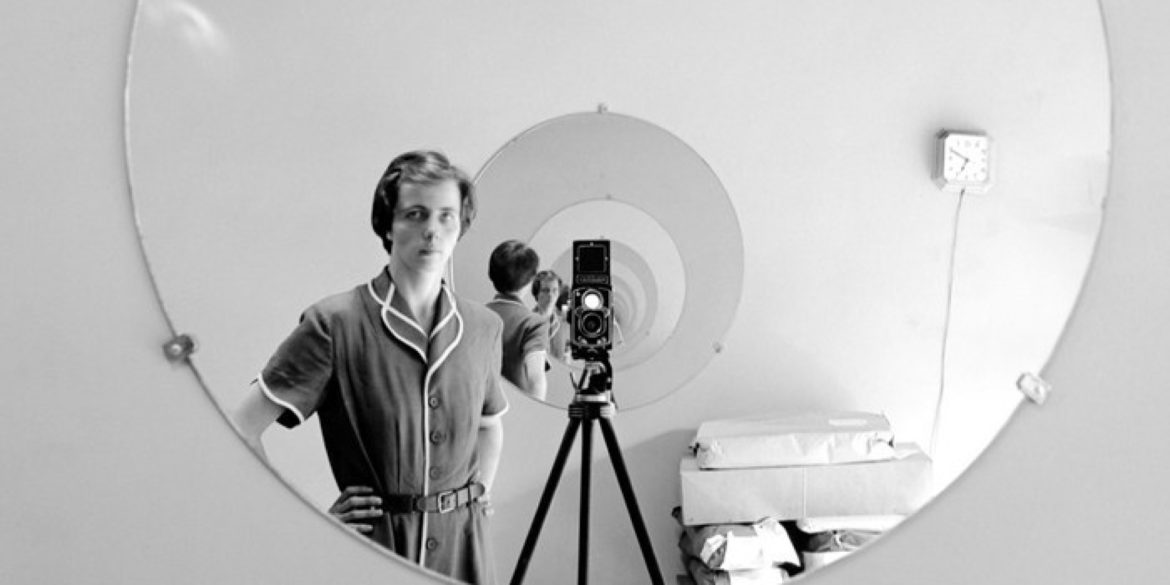By all accounts, Vivian Maier was an eccentric and complicated woman, a mystery to those who knew her best (not many) and an outsider artist in the truest sense – a gifted street photographer who hoarded her own work, but continued to snap images everywhere she went in her paid job as a nanny for a series of families. Maier is a legitimately fascinating subject, and she deserves a much better movie than Finding Vivian Maier, John Maloof’s perplexingly well-regarded, Oscar-nominated, feature-length humblebrag about his discovery of her work.
This is not to say that Maloof’s story – and Finding Vivian Maier is most definitely Maloof’s story – is without interest. While working on a book about Chicago history, he frequented auctions and estate sales, looking for old negatives and images that might be of use. One purchase, a trunk belonging to the late V. Maier, delivered something else: a real-life mystery.
Filled with thousands of negatives and rolls of undeveloped film, along with miscellaneous odds and ends that had been methodically collected and stored for reasons unknown, it sent him on a slightly obsessive mission to discover more about the photographer. His film details that journey, presenting some of Maier’s photographs throughout its standard, creakingly deployed talking heads format, in which former employers, charges, and acquaintances provide their (often conflicting) recollections of the woman herself, and various art historians and gallery owners chime in with their thoughts on her work. It’s as standard as a documentary can be, aesthetically, and not distinguished in any particular way visually.
But aesthetics aside, one overarching question haunts the film: why would someone go to such great lengths to document their time and place through their considerable artistry, only to lock the photos away? Maier was intensely private, according to everyone, and very possibly mentally ill to some degree, but that’s still an extreme thing to do – thousands of pictures taken, tens of thousands maybe, rolls of undeveloped film, a lifetime of considered observation, for no one to see. That her medium was photography, which assumes a viewer, only underscores the strangeness.
It’s a great question, but it’s undercut by another nagging one Maloof can’t avoid – does he have the right to display them now that she can no longer object? A friend of Maier’s (one of the few she had, it seems) states it plainly: “If Vivian were alive, she never would’ve allowed this to happen.” Maloof deserves some amount of credit for allowing that statement to be aired, and he wonders about it himself later, but it has the feeling of someone who confuses raising an objection with answering it. He is, after all, now the mouthpiece for his accidental find, and, one assumes, this has been pretty lucrative for him. At its worst, Finding Vivian Maier plays more like a promo for “a Maloof exhibition, coming soon to a gallery near you!” than a heartfelt appreciation of a forgotten (or never known) master.
That queasiness never subsides. On the other hand, the images themselves are striking – focused on the ignored and passed-over denizens of Chicago slums, on crime scenes, poverty and surreal juxtapositions, on the range of small joys and kindnesses that she encountered just walking the streets, they paint an indelible picture that’s simultaneously raw and empathetic, violent and full of grace. All were shot from chest-level, with the camera that hung around her neck, and so often give the impression that the figures in them are looming above you. The fact that she herself asked no one’s permission to photograph them, stealing their images on the sly, adds another wrinkle – she stole unguarded moments from strangers, and now a stranger has stolen them from her, to put on a stage she probably would’ve rejected.
When he’s not breathlessly recounting his own tenacity in getting the pictures to the world, Maloof does often come across as a true believer, and I don’t doubt that he is. But in its first moments, the film clues you right in. An off-camera Maloof asks one interviewee whether he would’ve done anything different in retrospect, and he replies, “I would’ve bought that trunk instead of you.”
They both laugh. I doubt Vivian Maier would’ve joined in.

